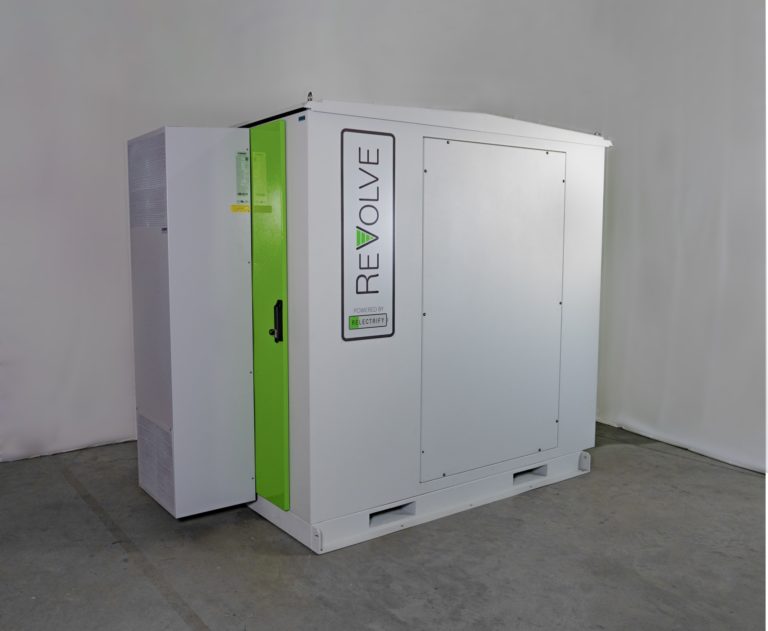From pv magazine International
Australia-based Relectrify has announced plans to target utility, commercial, and industrial customer applications with the initial release of its ReVolve battery energy storage product, a modular 120 kWh system that uses second-life Nissan Leaf EV battery packs.
The ReVolve battery energy storage system (BESS) is fully integrated with the company’s cell-level battery management system (BMS), inbuilt inverter, and control system. It is designed for installations in the 120 kWh to 2 MWh range.
Relectrify CEO Valentin Muenzel said each three-phase unit provides grid-compliant 400-480 Vac output, with 120 kWh of capacity and 36 kVA of continuous power. The units are suitable for both grid-connected and off-grid applications.
The Australian Renewable Energy Agency (ARENA) said Relectrify, which has been working with American Electric Power and Nissan North America on a pilot project, will now finalize development and undertake certifications ahead of the deployment of 20 ReVolve battery units across C&I applications throughout Australia.
“In some ways, we didn’t want to develop this product, but the market really pulled it out of us,” Muenzel said. “Our pre-sales interest in the product has been very wide, from community battery storage applications, utilities looking for back-up and outage support for weak rural networks, and peak shaving for EV charge installs, to construction and mining services firms interested in stand-alone power supply and genset diesel fuel reduction.”
Muenzel said Relectrify’s BMS+Inverter technology – which avoids the need for standalone inverters – means the ReVolve is truly competitive price-wise, coming in 30% to 50% lower than comparable products on the market, while offering an expected lifetime of 3,000 cycles. And at a roundtrip AC-to-AC efficiency of close to 90%, he said the second-life BESS compares strongly against new industrial storage systems.
“The storage market needs affordable battery storage, and we are thrilled to achieve this market-leading competitiveness with this product from the get-go,” Muenzel said. “With Relectrify’s cell-level technology seeing increasingly widespread use, we look forward to working with industry leaders to co-develop future products using second-life or new batteries, including for residential, commercial, industrial and grid applications.”
Muenzel acknowledged that the launch is an important milestone for the fledgling company. But he said the validation of a high-performing second-life system at a strongly competitive price-point is the much larger milestone.
EV batteries are often considered to have reached end-of-life when they have degraded to 80% of their initial capacity. However, Relectrify is determined to demonstrate the second-life battery remains a valuable and useful asset in stationary storage applications.
ARENA CEO Darren Miller said the project will help to reduce costs and improve pathways for battery storage to be installed at commercial scale, particularly in industrial settings.
“Battery storage is already playing a crucial role in supporting the transition to renewable energy within industry, however, we need to do more to make it commercially viable,” Miller said. “Second-life batteries have significant potential to drive down costs, and Relectrify’s battery management and inverter technology can provide what is needed to transform them into valuable assets for businesses looking to make the switch.”
This content is protected by copyright and may not be reused. If you want to cooperate with us and would like to reuse some of our content, please contact: editors@pv-magazine.com.









1 comment
By submitting this form you agree to pv magazine using your data for the purposes of publishing your comment.
Your personal data will only be disclosed or otherwise transmitted to third parties for the purposes of spam filtering or if this is necessary for technical maintenance of the website. Any other transfer to third parties will not take place unless this is justified on the basis of applicable data protection regulations or if pv magazine is legally obliged to do so.
You may revoke this consent at any time with effect for the future, in which case your personal data will be deleted immediately. Otherwise, your data will be deleted if pv magazine has processed your request or the purpose of data storage is fulfilled.
Further information on data privacy can be found in our Data Protection Policy.